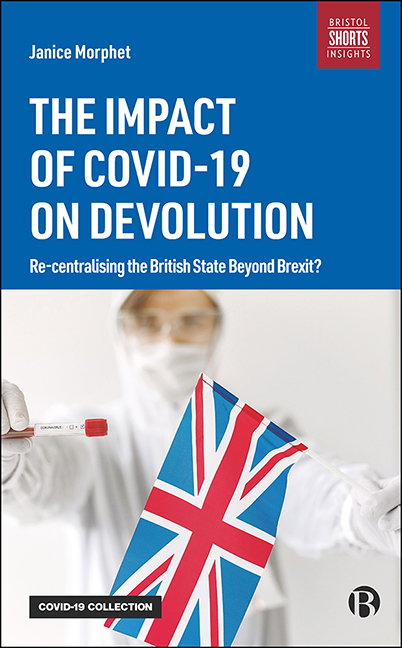Book contents
- Frontmatter
- Contents
- Preface
- List of Abbreviations
- one Devolution in the UK: The Twin Challenges of Brexit and COVID-19
- two Central Government, Brexit and COVID-19: Centralisation Through Privatisation?
- three The Role of the Devolved Nations in Meeting COVID-19
- four Getting to the Local: Managing the Pandemic in Practice
- five COVID-19 and a UK Unitary State Post-Brexit?
- References
- Index
one - Devolution in the UK: The Twin Challenges of Brexit and COVID-19
Published online by Cambridge University Press: 04 January 2022
- Frontmatter
- Contents
- Preface
- List of Abbreviations
- one Devolution in the UK: The Twin Challenges of Brexit and COVID-19
- two Central Government, Brexit and COVID-19: Centralisation Through Privatisation?
- three The Role of the Devolved Nations in Meeting COVID-19
- four Getting to the Local: Managing the Pandemic in Practice
- five COVID-19 and a UK Unitary State Post-Brexit?
- References
- Index
Summary
Introduction
The onset of COVID-19 has highlighted not only the Government's ill-preparedness for the pandemic across the UK but also how much of the Whitehall machine is only responsible for England. Since 1999, there has been very little acknowledgement of the devolved national administrations in Scotland, Wales and Northern Ireland within the UK Government and Whitehall (Cheung et al 2019). There have been few constitutional or machinery of government changes that have reflected the increasing depth of devolution in practice (Leyland 2011; McEwen et al 2020). There are few formal mechanisms for coordination and liaison with the UK Government through more regular contact between the governments of the three devolved nations (Clifford and Morphet 2015). This is in part because there is no separation for Government Ministers between their UK and English responsibilities. The slippage in their language often elides and confuses their responsibilities for England with those of the UK (Cushion et al 2020).
The COVID-19 pandemic in the UK has changed this. It is now transparent that the Prime Minister (PM), Boris Johnson, is PM of England and the powers devolved across health, the economy, culture and local government are different in each of the four nations. The PM has demonstrated the lack of understanding of these differences through his actions and attitudes towards the First Ministers (FMs) of the nations with devolved administrations, who have taken a much more proactive and cautious approach to managing the pandemic than has been the case for England. However, the PM has subsequently copied their initiatives – including for school closures, examination results, wearing of face coverings and lockdowns. Douglas Ross MP, the leader of the Scottish Conservative Party, that is separate from the party in the rest of the UK, said on BBC Radio 4's Today programme (2 November 2020) said that he wanted to see both governments working together to support Scotland through the pandemic – recognising the reality of the structure of the UK state.
At the same time in England, there have been similar tensions and confrontations between the PM and directly elected Labour Mayors in Liverpool, Manchester and London (Denham 2020a). In October 2020, these confrontations were concerned with the declaration of tiered lockdowns enforced by the Government, supported by imposed ‘deals’ rather than the application of common criteria across the country.
- Type
- Chapter
- Information
- The Impact of COVID-19 on DevolutionRecentralising the British State beyond Brexit?, pp. 1 - 18Publisher: Bristol University PressPrint publication year: 2021



